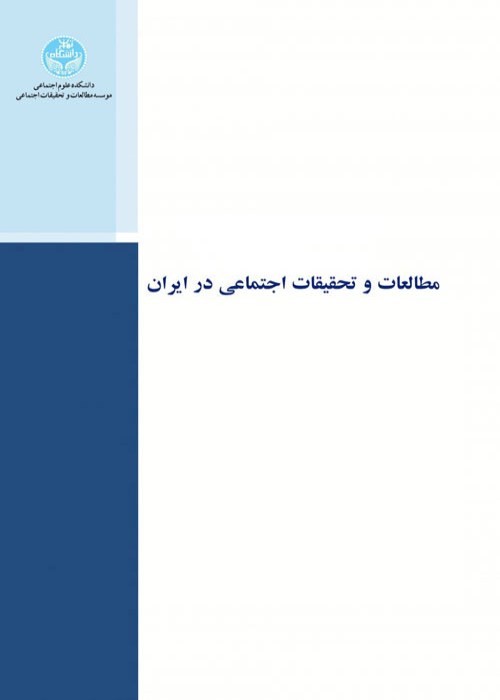Investigating the causes and factors of skepticism in the role of non-renewable energy in the production of a global risk (Case study: Global Climate Change)
Increased accumulation of greenhouse gases in the atmosphere due to human activities has intensified the level of global warming and its atmospheric system. One of the effective mechanisms and ensuring the continuation of sustainable actions to deal with global climate change is the development of new energy consumption habits. For this reason, the main goal of policy interventions is to create sustainable actions in optimizing energy consumption, especially fossil fuels, to reduce greenhouse gas emissions in response to global climate change. To this end, the public has access to reliable sources of information. The problem with examining human responses to climate change is the denial or skepticism promoted by a group of opponents of climate change policies using misleading information sources. The present study is a review of the denial of global climate changes. The organized conservative movement, and especially its affiliated think tank, plays an important role in denying the reality and importance of man-made global warming. They are well aware that if citizens trust reliable scientific sources, they will receive the necessary information about environmental issues and responsible environmental behaviors, and many of their economic and political interests will be threatened and their position in the national or international arena will lose. In this paper, based on Palmand(1992) social risk assessment approach, the role of risk producers, risk researchers, risk arbitrator and risk informants in creating ambiguity and skepticism is investigated.
The present study is a review of the denial of global climate change and is considered as a documentary study. The study addressed the following questions: What is environmental skepticism? Why science is used to cover environmental hazards. Documentary technique was used in the research literature section. Exploratory studies were conducted to expand the perspective and determine the scope of the research. Keywords for data collection were: environmental skepticism / social construction / risk producers. Access to the data included libraries, sites related to the publication of research works such as University Jihad, external sites such as Google Scholarship, and free search based on concepts such as environmental risks / science.
In the process of producing environmental skepticism, the role of four categories of factors should be considered, which are:1. Producers of risk(Most companies prefer to keep their anti-environmental activities out of the public eye. Different levels of organizational governance and corporate coalitions and public policies resist public opposition. Hence, they form progressive groups to protect their interests.2. Risk researchers: From the beginning of the denial of climate change, conservative industries and think tanks were aware of the importance of hiring their advocate scientists to make climate change uncertain. 3. Risk arbitrator: Conservatives usually support ideals such as individual liberty, private property rights, limited sovereignty, and the expansion of the free market, while Democrats, especially liberals, advocate for goals such as collective rights, market regulation to protect citizens' rights, quantity and quality of government social services and support for government intervention to protect the rights of vulnerable groups. 4. Risk informants: Media objectivity is an important issue as environmental issues change from being a status issue to a political issue. Owners of multinational industries and companies are constantly using the media, experts or scientists to prevent social change in attitudes towards global warming.
As a result, environmental activists, scientists, and policymakers redouble their efforts to encourage environmental protection, but in the meantime such efforts faced with some oppositions, and the opponents used their sources to thwart international action to counter climate change by relying on its economic and political power. One of these barriers to generating environmental skepticism about occurrence is the escalation of a hazard. Therefore, trying to expose or legitimize an immediate environmental claim does not in itself guarantee that corrective action will be taken. Successful environmental claims must have powerful elements that ensure that they will not perish in a sea of apathy, irrelevance and skepticism. Six essential factors can be identified for the successful construction of an environmental problem: 1)The environmental issue must have the scientific authority and credibility of the claims; 2) Having one or more scientific promoters who can turn the fascinating and mysterious aspect of research into an environmental advocacy claim; 3) The environmental problem must be considered by the media, in which this claim seems both real and important;4) A potential environmental issue must be magnified in objective and symbolic terms; 5) There must be economic incentives to take action on environmental issues; 6) Finally, in order for the environmental issue to be successfully and fully debated, it must have a supporter who guarantees both its legitimacy and continuity.
- حق عضویت دریافتی صرف حمایت از نشریات عضو و نگهداری، تکمیل و توسعه مگیران میشود.
- پرداخت حق اشتراک و دانلود مقالات اجازه بازنشر آن در سایر رسانههای چاپی و دیجیتال را به کاربر نمیدهد.



